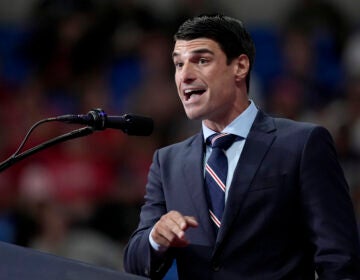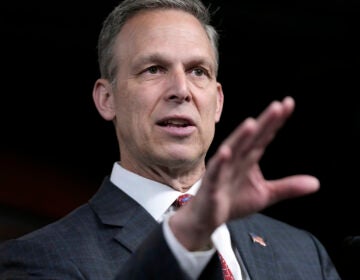A showdown could be brewing between U.S. Rep. Perry and the Jan. 6 committee
Perry tweeted Tuesday that he will not cooperate with the panel, calling it “illegitimate.”

Rep. Scott Perry, R-Pa., discusses the infrastructure bill making its way through congress during a news conference held by the House Freedom Caucus on Capitol Hill in Washington, Monday, Aug. 23, 2021. (Amanda Andrade-Rhoades / AP Photo)
A U.S. House committee investigating the Jan. 6 attack on the U.S. Capitol wants to talk with midstate Congressman Scott Perry (R, PA-10) about what he knows – but the GOP lawmaker said Tuesday that he’s “declining” that request.
That refusal may be setting the stage for an unusual legal battle between a standing committee and a sitting member of Congress.
“I think it was inevitable that members of Congress would need to be brought before this investigation,” said Penn State Harrisburg assistant professor of Public Policy and Administration Dan Mallinson.
The House Select Committee wrote to Perry on Monday, asking to explain his role in an effort to install as Attorney General a junior Justice Department lawyer who supported former President Donald Trump’s election-fraud lie. Text messages show Perry talked with Trump’s chief of staff, Mark Meadows, about doing that – just days before the Jan. 6 attack.
Evidence from a separate U.S. Senate investigation shows Perry had directly referred that lawyer, Jeffrey Clark, to Deputy Attorney General Richard Donoghue in a conversation on Dec. 27, encouraging Donoghue to rely on Clark as “someone who could really get in there and do something about [election fraud claims].”
Perry tweeted Tuesday that he will not cooperate with the panel, calling it “illegitimate.” That’s despite federal courts repeatedly upholding its document requests.
(1/2) I stand with immense respect for our Constitution, the Rule of Law, and the Americans I represent who know that this entity is illegitimate, and not duly constituted under the rules of the US House of Representatives.
— RepScottPerry (@RepScottPerry) December 21, 2021
The House committee must now decide what it will do next, and its past actions could signal what that might be.
When several prominent Trump White House staffers refused to cooperate when called upon, the panel subpoenaed them. Those staffers include former Chief of Staff Mark Meadows and White House strategist Steve Bannon, who along with other insiders the House committee has taken an interest in, have gone to considerable lengths to block the panel’s efforts.
Meadows and Bannon were both charged with contempt of Congress in the last month, which carries fines and potential jail time. A jury is set to hear Bannon’s case in mid-July. Meadows, who initially turned over thousands of pages of emails and text messages, changed tack just before he was set to sit for a deposition with the committee earlier this month.
Former National Security Advisor Michael Flynn, who has also been asked to testify and has refused, is now suing in federal court to block the enforcement of subpoenas he’s received.
Rep. Perry could be next, Mallinson said, but he added there’s a lot of unknowns.
“This is a little different than Mark Meadows or some of the other outside people,” Mallinson said. “I wouldn’t be surprised if there’s somewhat different rules for a sitting member of Congress than a private citizen.”
University of Baltimore legal professor Kim Wehle wrote in The Atlantic that the law isn’t clear on whether a subpoena of a member of Congress could be enforced. But Congress can investigate its own members, and has done so when they’ve been accused of misconduct.
A rulebook on Congressional subpoena power doesn’t specify who can be subpoenaed, only that committees can generally issue them as long as a majority of its members approve.
Duquesne University law professor Bruce Ledewitz explained the dominant political party in Congress typically does not “investigate the other side” following an election.
“But the [House Select] committee is not a criminal investigation. It’s not an ethics investigation,” Ledwitz said. “It’s trying to tell a story, and it’s a very important story for the American people to understand…the theory that the 2020 election results could be overturned in some way. That theory has to be exposed and repudiated by Congress and explained to the American people.”
Brian Allen, who had planned on running against Perry in the spring primary before suspending his campaign in October, said voters in Perry’s district will likely reward the five-term Republican for standing against the House committee.
Allen added state lawmakers are also considering redrawing that district to include a larger share of Republican voters by the time the primary rolls around in May.
“Assuming this district is little changed in the final map, Perry thumbing his nose at the 1/6 commission will be a feather in his cap,” Allen wrote in an email.
House Select Committee Chairman Bennie Thompson (D, MS-2) signaled in his letter to Perry that the panel wanted to talk with him by early next month, which means a decision on whether to subpoena could come around then.
WHYY is your source for fact-based, in-depth journalism and information. As a nonprofit organization, we rely on financial support from readers like you. Please give today.






